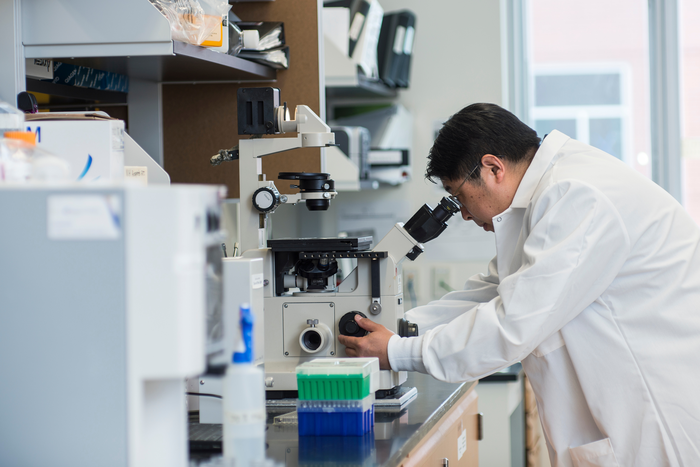Do a person’s antibodies work to block the COVID-19 virus from infecting one’s system? Are these antibodies also capable of blocking emerging variants such as the omicrons?

Credit: Photo by Evan Cantwell/George Mason University
Do a person’s antibodies work to block the COVID-19 virus from infecting one’s system? Are these antibodies also capable of blocking emerging variants such as the omicrons?
These are the questions everyone is asking. And researchers at George Mason University have developed, Ha-CoV-2, a non-replicating rapid SARS-CoV-2 pesudovirus system that can quickly and quantitatively measure the ability of one’s antibodies to block SARS-CoV-2 and its variants in vitro.
A cross-disciplinary team coordinated by scientists at Mason’s Center for Infectious Disease Research (CIDR) has developed the hybrid alphavirus-SARS-CoV-2 pseudovirus system that can robustly express reporter genes in cells within hours to rapidly measure neutralizing antibodies. Ha-CoV-2 pseudovirus was utilized against the COVID-19 virus and its variants including Alpha, Delta, and Omicron, as well as the currently emerging omicron BA.2 variant.
This cutting-edge technology, recently published in the journal Cell Reports Methods, reduces a typical two-day process down to a few hours. The Mason team began working on this challenge when COVID-19 first emerged in the public eye and this important breakthrough was possible due to a combination of factors.
According to Dr. Yuntao Wu, a professor and virologist in Mason’s College of Science and team’s primary investigator, “The lab leveraged learnings from our prior HIV and polio virus research and Mason’s extensive, high-level and integrated infectious disease facilities, just as the SARS CoV-2 virus emerged.”
Brian Hetrick, who performed novel viral vector-based research with Wu, co-invented the pseudo virus system while pursuing his PhD at Mason. “I attempted to make a hybrid alphavirus vector-based pseudovirus for SARS-CoV-2. We hoped to have a more robust and rapid system for screening and measuring antiviral drugs and antibodies. We luckily got it after a few failed attempts,” Hetrick said.
The team came up with the new pseudovirus technology in the summer of 2020. “We learned from previous SARS-CoV-2 pseudoviruse technology that we could get a superior technology with both higher precision and faster speed to quantify neutralization antibodies,” Wu said.
Wu’s lab then collaborated with researchers from Mason’s Center for Proteomics and Molecular Medicine and the CAPClia certified laboratory whose saliva testing method to monitor COVID-19 spread provided the large amount samples required to dilute the serum and confirm the technology’s powerful impact. By October of 2020, Wu and his team at Mason had filed for a provisional patent.
The science underpinning the discovery reviews the concentration of antibodies in one’s blood at various levels of dilution to determine what is the minimal levels required to block the virus particle getting into the cell. “People are different, and so are their neutralizing antibodies produced from vaccination,” Wu said. This Ha-CoV-2 system can tell a person his/her/their antibodies’ strength to neutralize SARS-CoV-2 or a particular variant. Some have stronger antibodies due to prior infection, and whether a person received one or more vaccine. Vaccination and repeated exposure can trigger stronger antibody response.
The technology has a multitude of virus monitoring applications in the public and private sector. For example, within the first few weeks it emerged, this team quickly understood how infectious, (10 times more infectious), the Omicron virus would be.
Throughout the winter of 2021-2022, the highly infectious Omicron variant dominated the global COVID-19 pandemic caseload. Although not as severe for the majority of those patients infected, Wu suggests, due to its rapid spread, “Most of the future baselines will start with protection (including when to get boosters), detection, and treatment against Omicrons. This rapid pseudovirus technology could identify antibody levels and their efficacy to determine if one should need additional protection and could become part of an organization’s or person’s structured antibody assessment process.”
Their findings could have significant impacts for pandemic control strategies.
“Just think of it,” Hetrick encouraged. “Rather than the now prevalent ‘back to school uncertainty,’ imagine if members of the Mason community could go through an antibody screening at the beginning of an academic year and receive a report detailing their antibody protection levels,” proposed Hetrick.
“You’d have the peace of mind to know you are physically protected so you should be fine to come to class or to work. Or conversely, based on the antibody levels, if one might not be protected, so a booster would be available to strengthen the antibody response,” Hetrick explained.
The CDC has not yet published acceptable levels of neutralizing antibody, and there is no FDA-approved quantitative kit to measure blood neutralizing antibody levels.
Currently, the Mason team and their collaborators from George Washington University and University of Toledo are applying the technology to measure neutralizing antibodies from immune-compromised people after their vaccination, in hope to gain detailed information so that educated decisions can be made regarding the need for booster shots.
Journal
Cell Reports Methods
DOI
10.1016/j.crmeth.2022.100181
Article Title
Development of a hybrid alphavirus-SARS-CoV-2 pseudovirion for rapid quantification of neutralization antibodies and antiviral drugs
Article Publication Date
8-Mar-2022




